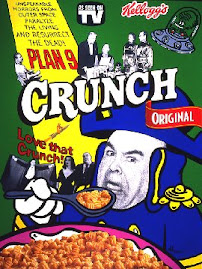By Doug Gibson
"Gabriel Over the White House" is one of the most, contradictory, fascinating films we've encountered in the Plan9Crunch cyberworld. It's a 1933 pre-code motion picture from MGM, but it's not devoted to "immoral lifestyles," such as "Employee's Entrance," or a sexual innuendo film such as "She Done Him Wrong." Rather, "Gabriel Over the White House," is, like the pre-code "Heroes for Sale." It's a film that condemns the U.S. capitalist political and economic system as one that favors the rich, powerful and criminal elements over the poor and middle class; it portrays the power structure as one that deliberately oppresses the common people.
(I realize I sound like a derivative humanities professor but I'm just explaining the pre-code political stances in film history.) Anyway, the film involves the tenure, in the depths of the Depression, of U.S. President Judson "Jud" Hammond, played by Walter Huston. He's a political hack, a gregarious pol beholden to all special interests, full of faux sentimentality and faux good cheer. In one scene, he jocularly asks his young political aide, Hartlee Beekman (Franchot Tone) if he can call him "Beek."
President Hammond is injured in an accident that leaves him in a coma for a while. While in the coma, he is endowed with the spirit, if not the actual indwelling, of the Angel Gabriel. When he awakes, he's a completely different leader, resolute and determined to stamp out corruption and crime. To do so he declares martial law, dissolves Congress, diverts money -- by fiat -- to veterans, creates jobs programs and equality programs, spending billions that have been diverted from the rich and special interests. He also nationalizes alcoholic beverages, and uses U.S. military might to capture an Al Capone-type character and his cronies, has them court martialed in a "star chamber," and once convicted, summarily executed against a wall. The film's climax involves President Hammond forcing his European allies to pay their war debts to the U.S., with a not-too-subtle promise that the U.S. will attack them if they don't pay up.
At that point, President Hammond dies, presumably of deferred injuries from the accident, and the nation mourns the death of a great leader of the people who has died.
This is a fascinating time-capsule film. It lionizes a protagonist, Hammond, who uses tactics that a Stalin or Mussolini used. Of course, all the "reforms" that Huston's president are successful, from providing bonuses and jobs to wiping out organized crime and setting shifty political colleagues and foreign allies straight. As a citizen, the film teaches that you only have to allow President "Angel Gabriel" Hammond to tear up your constitutional rights and become a dictator end wrong-doing.
Rumor has it that this film was President Franklin Delano Roosevelt's favorite movie; our leader during the Great Depression probably envied "President Hammond" his ease at swatting away congressional and foreign opposition. And remember, Hammond is a hero in this film, none so much as when he's shooting gangsters against a wall and threatening European allies with military destruction.
Another star of the film is Karen Morley, who plays President Hammond's secretary, Pendola Molloy, who falls in love with Tone's Beekman. She serves as sort of the moral conscience of the film, initially distrusting the "new" Hammond, but eventually revering the "dear leader." Huston, it must be noted, is absolutely magnificent in "Gabriel Over the White House." His before-and-after transformations are done superbly and his screen presence and gravitas makes the audience sympathize with the new president. He may be a dictator, but he's an honest, likable dictator.
I quote from Wikipedia the following: "Controversial since the time of its release, Gabriel Over the White House is widely acknowledged to be an example of totalitarian propaganda. ... the author of the original novel, was a "liberal champion of government activism"] and trusted adviser to David Lloyd George, the Liberal Prime Minister who brought Bismarck's welfare state to the United Kingdom.The decision to buy the story was made by producer Walter Wanger,variously described as "a liberal Democrat" or a "liberal Hollywood mogul." After two weeks of script preparation, Wanger secured the financial backing of media magnate William Randolph Hearst, one of President Franklin D. Roosevelt's staunchest supporters, who had helped him get the Democratic presidential nomination and who enlisted his entire media empire to campaign for him.Hearst intended the film to be a tribute to FDR and an attack on previous Republican administrations."
Louis B. Mayer, head man at MGM, hated the film. Conspiracy theorists have alleged a long time that the film was a sort of "dry run" for Roosevelt to take similar measures as "President Hammond" does. There are claims that Roosevelt had a hand in the script. Frankly, I doubt that. However, the film is hard to defend for anyone who adhere to our Republican form of government. It's best thought of as a misguided, yet idealistic fantasy of a strong leader able to solve all the problems of a nation mired in the Great Depression.
Watch a couple of clips from the film via YouTube. It can be purchased via amazon, as well.



No comments:
Post a Comment